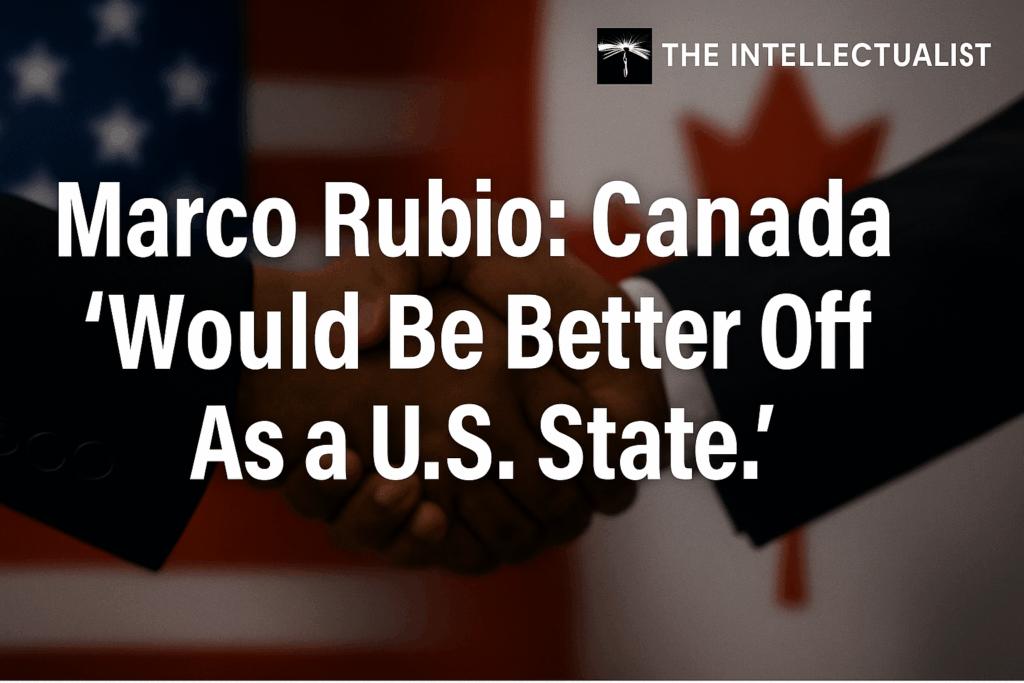Marco Rubio: Canada “Would Be Better Off As a U.S. State.”

On Sunday, April 27, 2025, U.S. Secretary of State Marco Rubio sparked renewed controversy over U.S.-Canada relations during an interview on NBC’s Meet the Press, suggesting that Canada “would be better off as a U.S. state.” Rubio’s statement came amid heightened diplomatic tensions between the two nations as Canada prepared to elect new leadership, and followed years of deteriorating trade relations under the Trump Administration.
Speaking to moderator Kristen Welker, Rubio stated that while the United States has long cooperated with Canada on many issues, recent trade negotiations had strained the relationship. Rubio specifically pointed to what he described as Canada’s “unfair trade practices” and referenced conversations with President Donald Trump about Canada’s economic reliance on favorable trade terms with the United States. “The president has made that point when he responded to the previous prime minister in regards to this,” Rubio said. “He thinks Canada would be better off as a state.”
Rubio claimed that former Canadian Prime Minister Justin Trudeau privately told Trump that Canada could not economically survive without maintaining trade policies that disadvantaged the United States. According to Rubio, this admission fueled Trump’s offhand remarks suggesting annexation. Although Rubio framed the comment as a reflection of Trump’s frustrations rather than a literal policy position, the remark quickly generated headlines internationally.
The timing of Rubio’s comments was notable. Canada is currently in the midst of a critical election that will determine its next prime minister. With the political landscape in flux, many in Canada viewed Rubio’s remarks as an unwelcome intrusion into domestic affairs. Canadian leaders from across the political spectrum swiftly rebuked the suggestion. Mark Carney, Canada’s newly elected Prime Minister, dismissed the idea outright in a press conference, asserting, “Canada will never become a U.S. state. We value our sovereignty and independence too much to ever entertain such a notion.”
International reactions were swift and mixed. Some U.S. conservative commentators praised Rubio’s bluntness, arguing that Canada’s trade policies had long deserved greater scrutiny. Others, including traditional allies of both countries, expressed concern that such rhetoric could deepen diplomatic fractures at a time when global alliances are already under strain.
While Rubio attempted to downplay the significance of his remarks later in the interview, emphasizing that cooperation between the U.S. and Canada remained strong on issues like border security and energy policy, the damage had already been done. Media outlets across North America covered the “51st state” comment extensively, with some Canadian analysts warning that U.S. rhetoric could fuel a resurgence of nationalist sentiment north of the border.
The Trump Administration, for its part, did not immediately offer clarification. A brief statement from the White House Press Office reiterated the administration’s commitment to “strong, fair, and mutually beneficial relations with Canada,” but declined to directly address Rubio’s comments. The ambiguity left open questions about whether Rubio’s remarks were an intentional trial balloon for future U.S. foreign policy or simply an unsanctioned comment made during a live broadcast.
Historically, proposals to annex Canada have surfaced occasionally in American political discourse, typically as jokes or rhetorical flourishes rather than serious policy suggestions. However, against the backdrop of real-world trade disputes and shifting alliances, Rubio’s comments carried more weight than similar remarks might have in the past.
As Canada moves toward finalizing its election results, observers on both sides of the border are closely monitoring how the new Canadian government will approach relations with Washington. Analysts suggest that if tensions continue to escalate, both nations could face a cooling of diplomatic and economic cooperation that would have lasting consequences well beyond the current political cycle.
Rubio’s remarks, regardless of intent, have now placed U.S.-Canada relations at the center of geopolitical discussion in a way not seen since the early days of the Trump presidency. Whether the incident will ultimately amount to a diplomatic footnote or a defining moment remains to be seen, but for now, it has injected a new layer of uncertainty into one of America’s most important bilateral relationships.

